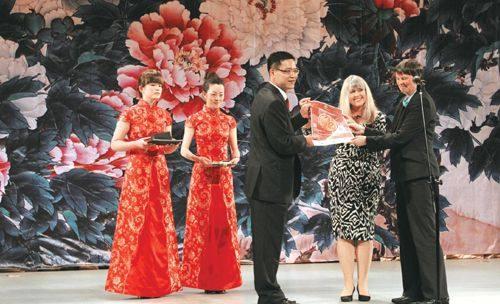《牡丹亭》相约“回家”
2012-04-29朱旭明
朱旭明



四月的浙江遂昌,姹紫嫣红。
4月8日至10日,来自海内外的八方宾朋,欢聚山城遂昌,一同见证了气势恢宏、美轮美奂的2012中国遂昌汤显祖文化节。
满城尽唱《牡丹亭》
“原来姹紫嫣红开遍,似这般都付于断井颓垣,良辰美景奈何天,赏心乐事谁家院”,这优美而熟悉的唱词又一次萦绕在遂昌,这是各剧种《牡丹亭》“回家”艺术展演的一个场景。
遂昌是《牡丹亭》原创地。明朝万历二十一(1593)年,伟大的戏剧家、文学家汤显祖在遂昌任县令。万历二十六(1598)年弃官归里。他在遂昌五年任内兴教劝农、除恶缉盗、灭虎除害,汤显祖五年善政,把遂昌治理得如同东晋陶渊明笔下的世外桃源。同时,他借俸著书,在此创作了不朽名著《牡丹亭》。
《牡丹亭》上承西厢,下启红楼,在中国乃至世界戏剧史上具有崇高的地位。它自问世起,备受人们欢迎,明代沈德符曾说“《牡丹亭梦》一出,家传户诵,几令《西厢》减价”。汤显祖自己最钟情《牡丹亭》:“一生四梦,得意处唯在牡丹。”四百余年来,《牡丹亭》历演不衰,影响极为深远,在剧本、声腔、演出风格上就显示出多种选择、多种面貌,呈现演出的多样性;演出戏班有宫廷戏班、家庭戏班、专业戏班、民间草台班等;演种剧种丰富多彩,如赣剧、秦剧、豫剧、昆剧、采茶戏、歌舞剧、越剧、婺剧等。
在4月8日至10日的中国遂昌汤显祖文化节上,原创地遂昌县举办了各剧种《牡丹亭》“回家”艺术展演活动。浙江昆剧团、江苏省苏州昆剧院、江西省赣剧院、江西省抚州市采茶歌舞剧院、丽水学院文学院话剧团、遂昌县越剧促进会、遂昌县婺剧促进会倾情加盟,带来了昆曲、赣剧、采茶戏、话剧、越剧和婺剧版《牡丹亭》,它们轮番上场,精彩亮相,倾情献演,可谓满城尽唱《牡丹亭》。
艺术家精湛演出异彩纷呈,特别是苏州昆剧院的青春版,青年演员陆雪刚、刘煜扮演的柳梦梅、杜丽娘,在游园邂逅时表现缠绵的情爱,婉约柔美,丝丝入扣,动人心旌;经过重新策划、排演的赴英国演出版《牡丹亭》,构思新颖,取舍有度,演艺精湛,他们倾情演绎的《牡丹亭》将演出推向高潮,让观众品尝了一道风格迥异、表现多样的文化大餐。
请《牡丹亭》集体“回家”,这是今年遂昌县人民纪念他们的“老县长”汤显祖的独特方式。与往年不同的是,在今年活动的主要嘉賓中,出现了几张外国面孔,他们来自莎士比亚的故乡——英国小镇斯特拉夫德。两国文化使者促成了东西方两位戏剧大师跨越时空的相会。4月19日,遂昌县联合浙江昆剧团组团,赴英国演出四场《牡丹亭》。这也是全本昆曲《牡丹亭》首次在莎士比亚故乡演出。
千秋遗爱满平昌
4月8日,遂昌平昌广场,鼓乐喧天,人头攒动。恢宏大气、场面震撼的文化节艺术巡展活动,精彩纷呈,亮点不断。
巡游彩车方阵中,是各剧种《牡丹亭》人物造型亮相,反映了各剧种《牡丹亭》“回家”和欢送《牡丹亭》赴英演出的喜悦心情,各剧种的柳梦梅、杜丽娘,在花车上摆出舞台上的不同造型,展现了《牡丹亭》不同版本的不同风情。然后出现的台阁方阵,反映遂昌人民怀念汤公之情,分兴教办学、劝农耕种、灭虎除害、纵囚观灯等。石练台阁这种民俗表现形式,是遂昌石练镇独特的民间艺术,至今已有上百年历史。这一幕场景生动有趣、惊险刺激,令观众叹为观止,个个惊奇不已。
紧随出现的是遂昌昆曲十番队。遂昌昆曲十番是在汤显祖任遂昌知县时得以传播的民间艺术,至今已有400多年历史,它以笙、箫、九云锣、梅管、提琴、鼓板、双清等演奏,因其演奏的曲目主要都是昆曲曲牌故称昆曲,遂昌十番2008年被列入国家级非物资文化遗产保护名录。
接着簇拥着汤显祖和莎士比亚两位世界文化巨人的彩车队驶入平昌广场中心区。世界文坛绽放着两朵奇葩——《牡丹亭》与《罗密欧和朱丽叶》;汤显祖与莎士比亚是辉耀于同一时期文化夜空的两颗巨星,堪称世界文学的两座巍巍高峰。这次文化节上开通了汤显祖与莎士比亚文化交流网,让两位世界大师“执手畅叙”。
随后展示的是《情系矿山》,表达了汤显祖与苦难矿工深深情缘。明代矿使为征矿税,不管矿工死活,汤显祖不与矿使同流合污,竭力抗争,屡遭权臣排斥,最后弃官回乡。
最后展示的是城东莲香队、王村口马灯队、云峰旱船队、三仁狮子队、大柘车龙队,他们争奇斗艳,热闹非凡……
优美的旋律,曼妙的舞姿,盛开的牡丹花,惊险的台阁,多样的民俗风情,让人目不暇接,流连忘返。
插花赏酒行劝农
此次文化节上,独具民俗特色的传统活动“班春劝农”,再现了400年前汤显祖执政时期大兴农事的场面,让各方宾朋大饱眼福,直呼过瘾。
4月9日上午,石练镇淤溪村,旗幡猎猎。村边的水车“吱吱”地转动,千年古樟上缀满寓意吉祥的茶灯;小凉亭中,身着古装的村民们正演奏着昆曲十番;不远处的空地上,小演员们打扮成各类神话传说中的人物,正表演着台阁……眼前俨然是一幅清丽的明代山乡图。
在这样一个“红杏深花,菖蒲浅芽”的晴好天气,遂昌知县“汤显祖”正在主持“班春”仪式,他率领众衙役备酒置花,带了春鞭,下乡劝农。正如他诗中所说“家家官里给春鞭,要尔鞭牛学种田。盛与花枝各留赏,迎头喜胜在新年”。在表演中,宣读祭春文,春牛出栏,插花赏酒,赠春鞭,打春鞭,舞草龙……在这些活动中,“酒神”、“花神”向观众分春饼等食物,将“班春劝农”推向高潮,欢声笑语响成一片……随后,春茶舞、谢茶舞、春鞭舞、春牛舞依次上演,这些由石练镇农民自己表演的舞蹈,将农事活动与音乐节奏很好地结合起来,展现了村民快乐劳作的场景。
汤显祖还将自己“班春劝农”的场景写进了《牡丹亭》的第八出《劝农》,描写了南安太守杜宝下乡劝农,呈现出“官里醉流霞,风前笑插花”的热闹场景。近年来,遂昌县对这一民俗活动进行挖掘和传承,并已成功申报为国家级非物质文化遗产。
千秋遗爱满平昌。几百年过去了,遂昌人民依然惦记着400年前曾经任过父母官的汤显祖:一次次上演他的名著《牡丹亭》;朗诵着他在这片土地上写就的美好诗篇;人们尊称他为汤公;遂昌人爱喝的酒叫汤公玉茗酒;城市的路命名为牡丹亭路、君子路;这里盛产的名茶是汤公所题的龙谷茶……□
Suichang Holds Tang Xianzu Festival in April
By Zhu Xuming
The 2012 China Suichang Tang Xianzu Festival was held in Su-ichang, a rural county in southern Zhejiang Province from April 8 through 10. Tang Xianzu (1550-1616) served as county magistrate in Suichang from 1593 to 1598. During his stay in the county, he wrote “The Peony Pavilion”, widely recognized as the most cel-ebrated play of Kunqu Opera, which is a UNESCO world intangible heritage. In the history of Chinese literature, “The Peony Pavilion” is an all-time masterpiece. After it was published, it was read eve-rywhere and troupes across the country vied each other in staging their versions of the play. Tangs masterpiece has enjoyed popular-ity over the last 400 years. It has evolved into plays of various re-gional operas and it has been staged by royal troupes and grassroots family troupes.
The three-day festival in Suichang this year attracted six troupes to stage their versions of “The Peony Pavilion.” They were Zhe-jiang Kunqu Opera Troupe, Suzhou Kunqu Opera Troupe, Jiangxi Ganju Opera Troupe, Wuzhou Caicha Opera Troupe, and the Mod-ern Drama Troupe of Liberal Arts School of Lishui Academy. Two Yueju Opera amateur groups in Suichang County participated in the shows. The troupe from Suzhou staged a youth version specially choreographed for British audiences. The audience in Suichang was lucky enough to watch the preview.
On the morning of April 8, a parade was at held at Pingchang Square in Suichang. Floats displayed the hero and heroine of “The Peony Pavilion” from participating troupes. After the floats were costumed figures standing high on sedans; they highlighted what Tang Xianzu did during his service as county magistrate in Su-ichang. After the sedan team came a music band playing ten Kunqu Opera pieces. The performance is said to have started during Tangs tenure in Suichang. The music piece is now a national intangible heritage under the state protection as of 2008. After the music band came two floats, one honoring Shakespeare and the other honoring Tang Xianzu. After the two floats were a group of floats that showed how Tang Xianzu tried to reduce heavy taxes on local mining in-dustry. Bringing up the rear of the parade were performing teams of local villages. They showed lions and dragons, lanterns and boats.
For Suichang, Tang Xianzu is more than a playwright. The 43-year-old Tang came to Suichang in 1593. According to the records of that time, landlocked Suichang was sparsely populated and the governments annual revenue was negligible. The area was so remote and wild that tigers sometimes menaced mountain vil-lages. Thieves and bandits were a common sight. After his arrival at the county, the first thing Tang did was to visit the Confucius Temple in the county and local scholars and influential personages. He restored education, cracked down on bandits and thieves, hunted tigers, and brought de facto local rulers under control. He also conducted taxation reform, levying fair taxes and forcing wealthy families to pay up the previous taxes they should have paid. During the five years he served as county magistrate, he promoted agricul-ture diligently. Many historians attribute to Tang the local peoples passion for singing and dancing and other folk festivities. The ten Kunqu Opera musical pieces popular in Suichang can be traced back to Tang Xianzu.
It is said that Tang Xianzu held a springtime festival to mark the beginning of farming season. He and other officials went to farm-lands and performed rituals, gave away gifts, and entertained farm-ers in a bid to promote agriculture and pray for harvest. At Tang Xianzu Festival this year, Tangs ritual, as restored and newly cho-reographed, was staged at Yuxi Village, Shilian Town on the morn-ing of April 9. The village was decorated with banners fluttering in a breeze; a waterwheel turned, making creaky noises in a stream; a giant camphor tree was adorned with many lanterns; village musi-cians played ten Kunqu Opera pieces at a pavilion; children dressed in costumes stood on sedans carried by adults and paraded. Then villagers staged dances and rituals to reproduce artistically how they work farmlands. Guests and local people flocked to Yuxi to watch the springtime festival at the village. They applauded the shows.
The annual Tang Xianzu Festival is now a part of the countys cultural development strategy. His influence can be seen in Su-ichang: two streets are named after the playwright; a local tea is named by him and marketed with a brand name in his handwriting; a local wine is named after him; his poems are widely read and cited; and “The Peony Pavilion” is frequently performed. □
